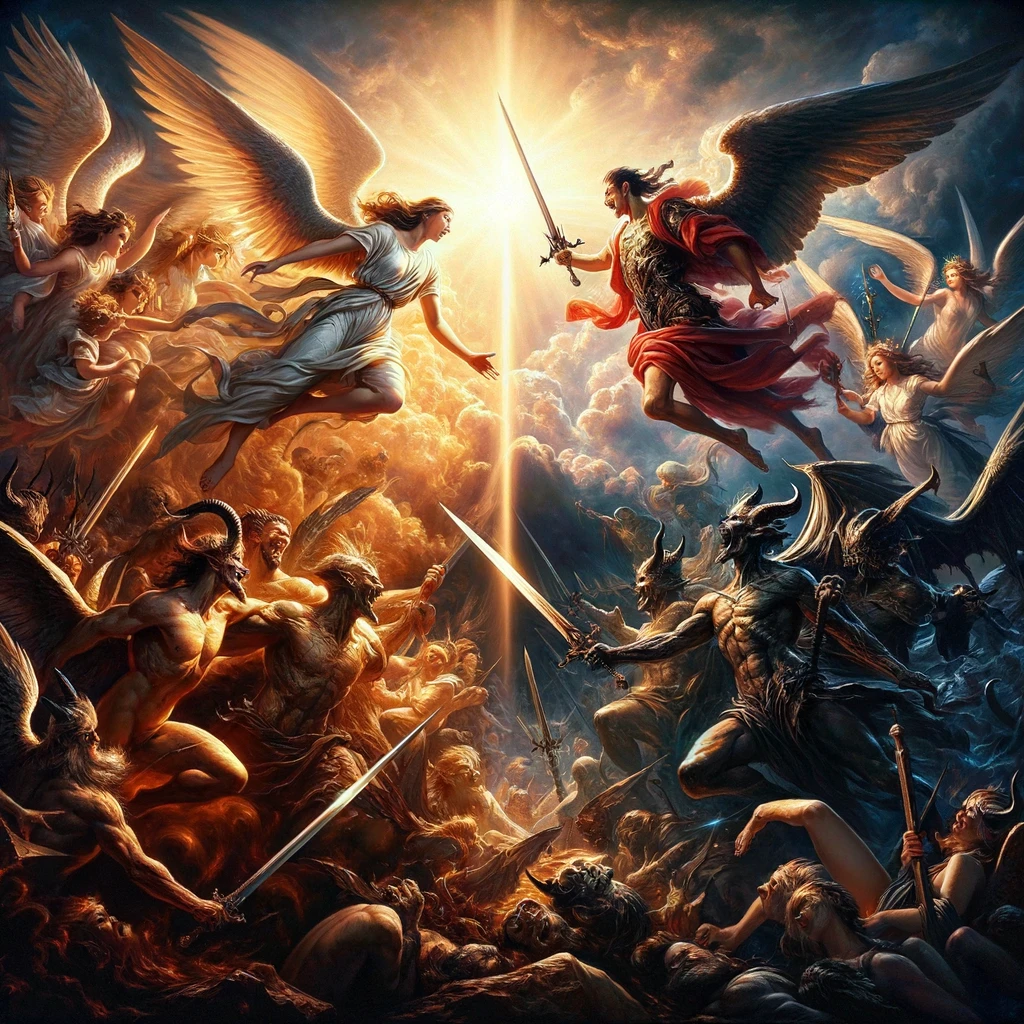For all the talk of distinctions that we love to draw between this person and that person, this group and that group, we’re really all the same.
You take people who are utterly secular, let’s think of the businessman out to crush the competition and build an empire. Then you get people who say, no, we’re not like that at all, we’re spiritual, we’re not into that pursuit. Then you sit with those, and you befriend them, and you walk with them, as you walk with the businessman as well. You see soon, very soon, in their language and in their art, the way they interpret power, just the way the businessman interprets power.
It’s very similar. They’ve just stopped talking about the competition, or the business deal, or the house on a hill, but they seek a kind of heaven, a kind of prize that is the moral equivalent, or the equivalent of that. The competition [is] now seen as demonic influences, as the things that try to steal their soul. The whole thing is reframed in competitive terms, without the blink of an eye, without any real thought. Before you know it, they’re on the power path in the name of spirituality, in the same way that the businessman, or the political leader, seeks to be the king of the hill.
Then they hear the idea that we’re gods, and there you go, now that they’re gods and goddesses, and they’re the supreme, ultimate rulers. No one dare touch them, because “if they touch me, you’re going to know that you messed with divine power,” all of it. It’s not that it is, how do I put it, a great amount of harm, and you could say good is done in these frames.
Some with power and money spend it in ways that help others, and some with this sort of idea, this idea of spiritual ascendancy, I mean they think of themselves on the scale of going up to becoming higher and higher and higher, and they deal with this sort of “ordinary” mass of humans around them. There’s some good done there too, but a lot of evil too, a lot of harm is done, and the biggest harm is actually done not to others, but to yourself in that, because there is an estrangement of your true nature that happens, right?
Because in that you emphasize, and emphasize in grand theatrical ways, because that’s all it is, is a theater, it’s nothing actually to it. It is just an assemblage of props and symbols that speak to your separation from the rest. You think of yourself as higher and better and more powerful and more able and more equipped than the rest. That trip has an incredibly incalculable price, because it’s the price of your soul. You lose who you are in that, because you think you are separate, and you emphasize that identity through this.
Of course, therefore, you look at the other as the enemy. You look at the other as the adversary, and you put labels on the other. You see the monster, and you say it’s bad and evil. You see demons around. You see agendas for your overthrow. Everything becomes suspicious. You become narrower and narrower in that way.
In the East, they have a word for these things in terms of the spiritual quest for power. They call it the “siddhis.” It is true, [it exists], from all that I could understand of it. It just makes some intuitive sense that if you would dedicate yourself to very strict yoga, to what you eat, and you meditate for long hours, and you just get more and more sensitive to what your senses can pick up, that your intuitive body will grow, if I can put it like that. You will begin to feel things before they happen, and you will begin to sense things that others don’t even see, that they’re oblivious to.
To those who don’t have that capacity, it would seem like pure magic, that pure power, that you have the ability to see these things. That power, you might think, is your big lever, your big sword with which you will, again, you’ll sublimate it. You’ll say, “oh, it is to fight for good that I have this. I’ll use the sword to fight for what is holy and right.” That’s how you’ll say it. But in fact, you will just get on a trip of self-indulgence, self-aggrandizement.
Every teacher in the Eastern tradition worthy of the title – there are, of course, many that just play the game to enrich themselves. For them [the worthwhile teachers], it’s almost the mark of a great teacher that he would say, that’s complete nonsense. It’s a complete waste of time. Of course, you can do that, but why?
It is exactly what Jesus meant when he said, what does it profit a man if he gains the world, but he loses his soul? He explained that those who are blessed are those who are humble and meek and who seek peace, who love and not hate, who love their enemies, who turn the other cheek. He was so clear about the profile of true blessedness.
I have mentioned it in another note, but one of the most beautiful stories along these lines I’ve ever heard was from my teacher, Papaji. He met with a yogi; I think the yogi was from a Western heritage. The way he explained it, the man has dedicated decades of his life to deep yoga and incredibly intense conditioning of the mind and body. He says, without blinking an eye, Papaji tells a story, he says that as they were meditating, the guy began to levitate and now, I mean, Papaji is not the kind of guy to outright make up a story.
So what exactly happened there, I don’t know and I don’t need to know because what is more interesting to me is that Papaji took it all and said, well, of course, he’s levitating. And he looked at the man afterwards, I think, or later on, I think, and he said to him, the man said, did you see what I did? And he said, “yeah, of course, but that’s nothing interesting. I mean, birds do it without thinking. What’s the big deal in that?”
And he asked the man, “that’s cool, but are you at peace? Are you at peace?” And the man said, “No, I’m not, I’m still seeking peace for my heart and for my mind.” Now there it is. All of these things are just displays, they’re just theater, they’re just exhibiting what is possible in the Lila of life, in the dance of life, in the maya, the illusions of it, the appearances of it, all sorts of conjuring tricks are possible.
And that is really no real power. As I say, it only appears as power, and the more you believe in the appearance of what is not real, the more you’re entangled in a fundamental lie that estranges you from your true nature. So when you drop all of that, and the dropping is just something that happens when you see through it, when you see it’s just a game, then the truth is you are untouchable.
It is not because you have acquired some power with which to ward off, it’s that all of those things don’t exist, so they have no power, they never have. The only power they had was what you gave to it through the story that you were believing, for your own reasons. And the story was a story of separation, let’s be clear. And when it’s all gone, then you see you’re never separate, you are not.
So what is there to harm you? I mean things can come, Jesus said they can come and kill you, that’s all they can do, they can kill your body, so really? You see the body is also just an appearance, it’s an extension of the mind. Like the whole universe is a dream, and if that is seen, not intellectually, but known and felt intuitively, I can put it like that, as an obvious, as an axiom, then these things are of no consequence.
And yeah, what is the story that I heard from Ram Dass once, who talks about the monk who lived up on the hill, and there was this great warrior that came through the land, and everybody was afraid of this warrior, a particularly cruel and merciless man, who took great joy in killing people in the most exquisite of manners. And he came and conquered the village beneath where the monk lived up on the hill, and then the monk refused to bow, he said everybody had to bow before him, he refused. And the warrior walked, marched up the hill with defiance and with anger, and he walks into the monastery where the monk stood, and he unsheathed his sword, and he pointed it at the man and said, “don’t you know who I am? I can pierce you with the sword and not even blink an eye.” And the man looked at him and said, “don’t you know who I am? I am the one that you can pierce with your sword, and I will allow it without the blinking of an eye.”
And the story goes that the warrior withdrew his sword in a moment of realizing that he was in the presence of truth. And that’s really what we’re talking about here, isn’t it? Do not lay up for yourself treasures on earth where moth and rust destroy it, says Jesus. And it does. All of these acquisitions of titles and symbols and badges of success and achievement, they don’t last. They come and they go.
Even in a given life you lose them. You lose them to time, you lose them to old age, you lose them to the change of the wind. It’s not anything that actually gives you anything permanent. And it also, as I said before, estranges you from your real nature as being one with all of these things that you now compete against to assert a certain kind of supremacy.
Do not lay up for yourself treasures on earth. Jesus said focus on heaven, which again can become a conceptual idea, but in the Gospel of Matthew in particular, Jesus is quite clear. Heaven is not something that waits. Heaven is here now. It’s the kingdom of God is here in this moment. And he explained what it is. It is exactly what we’re talking about. It is to open your heart to what is true beyond the appearance of this. What the Bible talks about is the lust of man and the blind pursuit of desire. Of course, there’s a whole other conversation about that. Desire is not evil. This is what has happened with the mind, took desire and made it evil. It’s not what is said. There’s a way to relate with it that makes it beautiful. It is the “separation gospel” that is the problem, the message, the dogmatism, the ideology of “I think therefore I am” that creates a separation.
So a lot more that can be said, but we’re simply saying if you’re pursuing power and achievement, it’s not wrong, but it will bring [unnecessary] suffering and it will not give you what you want. It is ultimately a fool’s errand. Some way of looking at it is to say that for some it takes multiple lifetimes, millions of years. Those ideas persist until you see through it. And then, you know what, peace is always there. It’s never not being right here, as close as the space between two thoughts in your own mind.

